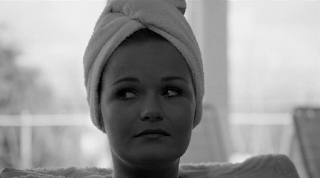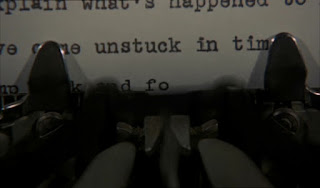Whether it’s the stand-up sessions or the striptease, Bob
Fosse directs performance exceptionally well. Gritty, sweaty, over-lit and
exposed as nervy, vulnerable humanity. Life is a cabaret old chum… and neither
Lenny nor Honey could ever be accused of not giving it the old Elsie of Chelsea
“go”.
It feels visceral and honest and yet at the end, having
witnessed the aftermath of Lenny’s inevitable death from over dose, you wonder
whether writer Julian Barry and Fosse
have almost overlooked this crucial aspect of Bruce’s make up.
  |
| Dustin on stage |
 |
| Dustin Hoffman |
Dustin Hoffman makes for a suburb Lenny Bruce prowling
the stage eyes alive with the possibilities of his next words – he is so
relaxed you feel he is making it up: I don’t know how much was improvised but that’s
proper acting?
  |
| Valerie performs |
Valerie Perrine as showgirl turned wife Honey is his
match especially in the flashback sequences that Fosse intermingles with the
main narrative. In unforgiving close-up, with no make-up, Perrine plays the
role of recovered junky to perfection. Could she have done more to save her
on-off man – maybe but she also did very well to survive herself after several
stints in prison and a life so much in the way of favours.
Theses framing devices work well as Lenny’s mother (Jan
Miner) and agent (Stanley Beck) are also interviewed the former, sharp,
intelligent, thought-through and the latter, increasingly revealed as
distracted and with other commercial fish to fry.
Bruce’s relationship with his mother is seen as close
and, in fairness, his agent simply tries to keep pace; his post-mortem windfall
of LP royalties affecting his attitude more.
But Lenny, on this showing, was in-corruptible blowing
his dough and his chances in a search for the truth that is still ongoing. The
truth hurts but only because it makes you laugh so much: the truth about words,
sex, politics and even Jackie Kennedy who was not trying to save her husband
but trying to get out of the car. This does not diminish her but makes her
tragically all the more real – doing what anyone of us would have done with our
partner apparently dead in front of us. But in 1964 the president’s wife had
acted to throw herself as a shield over her man: Lenny wanted to prick the
bubble to remove the spin and make us face up to life.
 |
| Honey at the check-in |
Lenny actually sees her at an airport but pretty much
accepts her career at least whilst it’s the only one they can afford… They were
made for each other but necessarily all the time and whilst family life
progresses, other issue start to come between them – chiefly drugs and Lenny’s
desire to push the envelope. He forces Honey into a threesome with a young
woman at one of their parties (Kathryn Witt) and then complains that she
enjoyed it too much.
 |
| Meeting the family |
 |
| Honey behind bars |
Strippers and stand-up (ahem) – alike or not: discuss?
But in making friends Lenny also makes many enemies, on purpose and for ever – the judiciary, the police, the feds, everyone who could possibly defend themselves he picks on. The crowds love it but he starts to get into deep water as the authorities fight back, dragging him into their process and robbing him of his comedy initiative: once he took them by surprise and forced many a retreat but now they have him surrounded.
Through legal process, weight of numbers and a thousand
pointless laws protecting freedom, they gradually rob him of his. He is forced
into a legal battle he can never win… he spirals downwards, weighed down by
legal text and case law, propped up by drugs as he spends his way into
oblivion.
Dusty Verdict: Lenny is a superbly affecting film that raises questions that remain vital to this day – the Tea Party and Mr Trump, the right-wing drift in the UK… these battles for free speech and thought are still being fought. Lenny left his mark and we’re all a bit freer because of it.
Hoffman and Perrine give performances that resonate on
deeply human levels and are worth the price of admission alone.
 |
| Lenny and Honey drive off in the MG |











































































